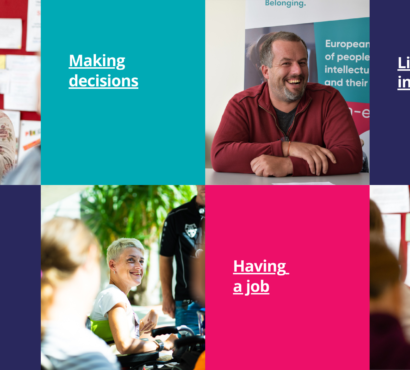Institutions are never an option!
Building human connections, being part of a group, belonging: These needs are human needs. People with intellectual disabilities want to share their lives with neighbours, friends and relatives. They want to live as independently as possible. And they want to contribute to their community.
Even though the UN Convention on the Rights of Persons with Disabilities (UN CRPD) establishes the right of all people to choose where and with whom to live, reality is still very different for many people with intellectual disabilities. Inclusion Europe therefore puts community living high on its agenda.
We have been working on this topic for many years and have been able to stir interest for the issue at the European level. There are lots of positive developments: Many countries, especially in Central and Eastern Europe, have revised their policies and started moving people out of institutions and into the community.
“There are still at least 1,438,696 persons living in institutions. Persons with intellectual disabilities and people with complex support needs are most likely to still live in institutional settings.”
Living independently and being included in the community
End segregation
CRPD Committee:
- General comment No.5 on Article 19 – the right to live independently and be included in the community
- Submissions on the right to live independently and be included for the UN CRPD Committee General Comment on article 19
Risks of institutionalisation:
- Why are people with intellectual disabilities still at risk of institutionalisation?
- Life after violence – a study on how women with intellectual disabilities cope with violence they experienced in institutions (EN and NL versions)
- Stories of survivors of institutionalisation
Read some of the work we have done to promote the right to live independently and be included in the community:
- Factsheet on Independent Living (.pdf) created together with ENIL
Deinstitutionalisation
Inclusion Europe is a member of the European Expert Group on the Transition from Institutional to Community-based Care (EEG).
Tools:
- Checklist on use of EU funds
- Common European Guidelines on the Transition from Institutional to community-based Care (2012)
- Toolkit on the use of European Union funds for the Transition from Institutional to community-based care (2014)
Reports:
- Report (.pdf) of the Ad-hoc expert group on transition from institutional to community-based care (2009)
- Report on the transition from institutional care to community-based services in 27 EU member states (2020)
CRPD Committee about deinstitutionalisation:
- CPRD Committee published in September 2022 “Guidelines on deinstitutionalization, including in emergencies”
- Inclusion Europe submission on the draft of the document June 2022 (.docx)
- Inclusion Europe submission in regional consultation 2021 (.docx)
More resources
- “Included in Society”, a report from 2003 written by Inclusion Europe and partner organisations, not only pointed out the harm large residential institutions do, but also established recommendations for policymakers on how to organise community-based care.
- Principles for quality evaluation of services
- User Councils in services for people with intellectual disabilities
- Empowering people with complex support needs
- The right to make financial decisions
- Children’s rights for all reports






